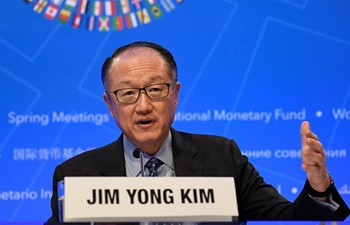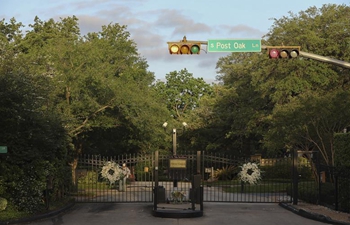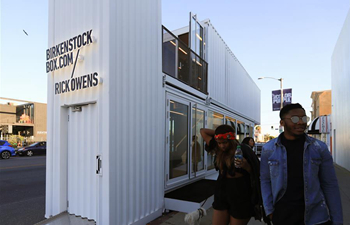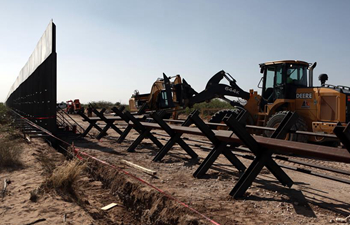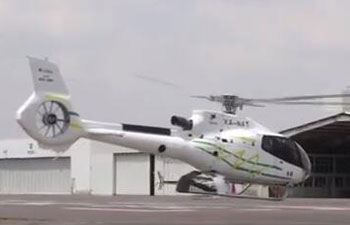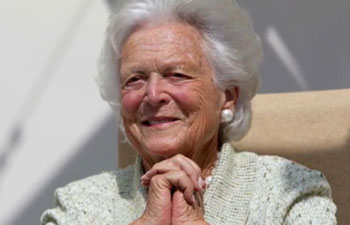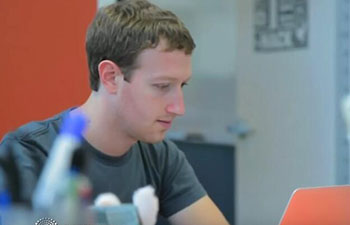HAVANA, April 19 (Xinhua) -- After a decade as Cuban president, Raul Castro on Thursday completed his second and final term in office with the satisfaction of having initiated necessary economic and social reforms and ensuring a smooth political and generational handover on the island.
Just as he had promised five years ago when he was elected head of state, Castro paved the way for a new and younger leader, ending almost six decades in power of the "historical generation" that led the rebel struggle in 1959 which overthrew dictator Fulgencio Batista, who had been in power since a 1952 coup.
"We have come a long way and it has been a difficult path. But we have done it honorably, together with our people, so that our children now and in the future are happy," Castro said recently.
The pragmatic and resolute former Cuban leader will turn 87 this coming June.
To reach his goal of making the island a prosperous and sustainable nation, Castro began a series of economic reforms and eliminated old laws and rules to adapt Cuba's socialism to modern times.
Since July 31, 2006, Castro temporarily took over as president after his brother Fidel fell ill, assuming the political leadership in the country.
In February 2008, Castro was officially elected by the National Assembly as president of the Council of State and vowed to preserve the revolution started in 1959. However, he did start a series of economic and social reforms.
The reforms were aimed at promoting and diversifying the sources of income of the island's economy and raising the quality of life of the population, without renouncing the social achievements of the last 50 years.
Three years later, he was chosen first secretary of the Communist Party of Cuba (PCC) at the organization's sixth congress, where delegates approved the economic and social policy guidelines, a document that laid the foundations for reforms to update the island's socialist model.
These "structural transformations" included the gradual reduction of public jobs, the increase of private work, updating the country's migration policy, as well as the authorization to purchase and sell homes and vehicles between Cubans.
They also included handing over idle lands to citizens to boost the country's agricultural production as the government imported around 80 percent of food products at that time.
The corresponding legal norms were published to set up cooperatives in non-agricultural sectors, as well as new laws for foreign investment, water use and reserves and taxes.
In April 2016, the PCC's seventh congress took place, an occasion on which Castro was reelected as first secretary, a responsibility he will continue to carry out until 2021.
At the congress, progress made in the process of updating the nation's socialist system was analyzed and new objectives were set aimed at reorganizing Cuba's monetary policy, prices and finances.
This process has been slow for many, but has shown the complex scenario the Caribbean country has faced in the last few years, a scenario marked by financial limitations and the crisis in Venezuela, its main economic and political ally.
Last month, the PCC admitted a slowdown and errors in its implementation of Castro's market-style reforms but vowed to continue updating the socialist model.
The party's central committee held a plenary session which was chaired by Castro to discuss the state of reforms undertaken since 2011 to open up the economy and give the private sector and foreign investment greater roles.
In this context, Castro recalled the obstacles the revolution has had to face and overcome over the last six decades.
"In the face of new challenges, the spirit of resistance must prevail. It has characterized our people, without a hint of pessimism and with total confidence in the future," he said.
Castro, a commander of his brother Fidel's rebel army, defense minister from 1959 to 2008 and second secretary of the PCC since its founding in 1965, has always been a follower of Fidel's humanistic ideals.
He has also upheld Cuba's historic position of self-determination and South-South cooperation, particularly in Latin America and the Caribbean.
Perhaps Castro's most important international moment was on Dec. 17, 2014, when simultaneously with then U.S. President Barack Obama, he announced that Washington and Havana had agreed to reestablish diplomatic relations.
After months of secret conversations in Canada, the former Cold War adversaries started a path to normalize their ties, a process that has been substantially rolled back by incumbent U.S. President Donald Trump.
The thawing ties reached their climax with Obama's visit to Havana in March 2016, the first by a U.S. leader in almost a century.
Since then, both governments have taken measures to accelerate the rapprochement, including the end of some economic and political sanctions imposed by Washington, although an embargo remains in place.
However, Trump's short time in the White House has seen a serious setback in relations, a consequence of supposed "acoustic attacks" that affected the health of U.S. diplomats in Havana as well as his political alignment with radical sectors of the Cuban exile community.
Despite the rollback, Cuba has reiterated its will to continue negotiating pending bilateral issues based on mutual respect and the sovereignty of each nation.
"The Cuban Revolution has withstood the attacks of 11 U.S. administrations of different political stances and here we are free, sovereign and independent," said Castro last December in his last speech as president in the island's parliament.
After handing over power to his successor, Castro will continue to act as a deputy to the parliament and as the first secretary of the Central Committee of the ruling PCC, which is considered as the leading force of Cuban society.







